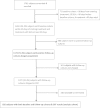Extensive drug resistance acquired during treatment of multidrug-resistant tuberculosis
- PMID: 25057101
- PMCID: PMC4184341
- DOI: 10.1093/cid/ciu572
Extensive drug resistance acquired during treatment of multidrug-resistant tuberculosis
Abstract
Background: Increasing access to drugs for the treatment of multidrug-resistant (MDR) tuberculosis is crucial but could lead to increasing resistance to these same drugs. In 2000, the international Green Light Committee (GLC) initiative began to increase access while attempting to prevent acquired resistance.
Methods: To assess the GLC's impact, we followed adults with pulmonary MDR tuberculosis from the start to the end of treatment with monthly sputum cultures, drug susceptibility testing, and genotyping. We compared the frequency and predictors of acquired resistance to second-line drugs (SLDs) in 9 countries that volunteered to participate, 5 countries that met GLC criteria, and 4 countries that did not apply to the GLC.
Results: In total, 832 subjects were enrolled. Of those without baseline resistance to specific SLDs, 68 (8.9%) acquired extensively drug-resistant (XDR) tuberculosis, 79 (11.2%) acquired fluoroquinolone (FQ) resistance, and 56 (7.8%) acquired resistance to second-line injectable drugs (SLIs). The relative risk (95% confidence interval [CI]) of acquired resistance was lower at GLC-approved sites: 0.27 (.16-.47) for XDR tuberculosis, 0.28 (.17-.45) for FQ, and 0.15 (.06-.39) to 0.60 (.34-1.05) for 3 different SLIs. The risk increased as the number of potentially effective drugs decreased. Controlling for baseline drug resistance and differences between sites, the odds ratios (95% CIs) were 0.21 (.07-.62) for acquired XDR tuberculosis and 0.23 (.09-.59) for acquired FQ resistance.
Conclusions: Treatment of MDR tuberculosis involves substantial risk of acquired resistance to SLDs, increasing as baseline drug resistance increases. The risk was significantly lower in programs documented by the GLC to meet specific standards.
Keywords: Green Light Committee; extensively drug-resistant tuberculosis; multidrug-resistant tuberculosis; tuberculosis.
Published by Oxford University Press on behalf of the Infectious Diseases Society of America 2014. This work is written by (a) US Government employee(s) and is in the public domain in the US.
Figures


Comment in
-
Editorial commentary: Treatment for multidrug-resistant tuberculosis: it's worse than we thought!Clin Infect Dis. 2014 Oct 15;59(8):1064-5. doi: 10.1093/cid/ciu578. Epub 2014 Jul 23. Clin Infect Dis. 2014. PMID: 25057100 No abstract available.
-
We must halt the progression of multidrug-resistant tuberculosis to extensively drug-resistant tuberculosis, no matter what the cost.Clin Infect Dis. 2015 Mar 15;60(6):968. doi: 10.1093/cid/ciu1145. Epub 2014 Dec 19. Clin Infect Dis. 2015. PMID: 25527650 No abstract available.
-
Analysis of Green Light Committee implementation and acquisition of second-line drug resistance.Clin Infect Dis. 2015 Mar 15;60(6):970. doi: 10.1093/cid/ciu1147. Epub 2014 Dec 19. Clin Infect Dis. 2015. PMID: 25527651 Free PMC article. No abstract available.
-
Extensively drug-resistant tuberculosis: you can teach an old dog new tricks.Clin Infect Dis. 2015 Mar 15;60(6):971. doi: 10.1093/cid/ciu1148. Epub 2014 Dec 19. Clin Infect Dis. 2015. PMID: 25527652 No abstract available.
-
Acquired drug resistance: we can do more than we think!Clin Infect Dis. 2015 Mar 15;60(6):969-70. doi: 10.1093/cid/ciu1146. Epub 2014 Dec 19. Clin Infect Dis. 2015. PMID: 25527653 No abstract available.
-
[Extensive drug resistance acquired during treatment of multidrug-resistant tuberculosis].Med Mal Infect. 2015 Jan-Feb;45(1-2):61-2. doi: 10.1016/j.medmal.2014.10.010. Med Mal Infect. 2015. PMID: 25893234 French. No abstract available.
References
-
- World Health Organization. The World Health Organization/International Union Against Tuberculosis and Lung Disease Global Project on Anti-Tuberculosis Drug Resistance Surveillance: anti-tuberculosis drug resistance in the world. Geneva, Switzerland: WHO; 1997.
-
- World Health Organization. Basis for the development of an evidence-based case-management strategy for MDR TB within the WHO's DOTS Strategy. Proceedings of 1998 Meeting and Protocol Recommendations; Available at: http://www.who.int/tb/publications/1999/en/ Accessed 6 June 2014.
-
- World Health Organization. WHO meeting to co-ordinate the DOTS-Plus workplan on pilot projects for the management of multidrug resistant (MDR) tuberculosis, 29 January 1999. Available at: http://www.who.int/tb/publications/1999/en/ Accessed 6 June 2014.
-
- World Health Organization. DOTS-Plus and the Green Light Committee: improving access to second-line anti-TB drugs. Available at: http://www.who.int/tb/publications/2000/en/ Accessed 6 June 2014.
-
- World Health Organization. Geneva, Switzerland: WHO; 2012. Global tuberculosis report 2012.
Publication types
MeSH terms
Substances
Grants and funding
LinkOut - more resources
Full Text Sources
Other Literature Sources
Medical
Miscellaneous

